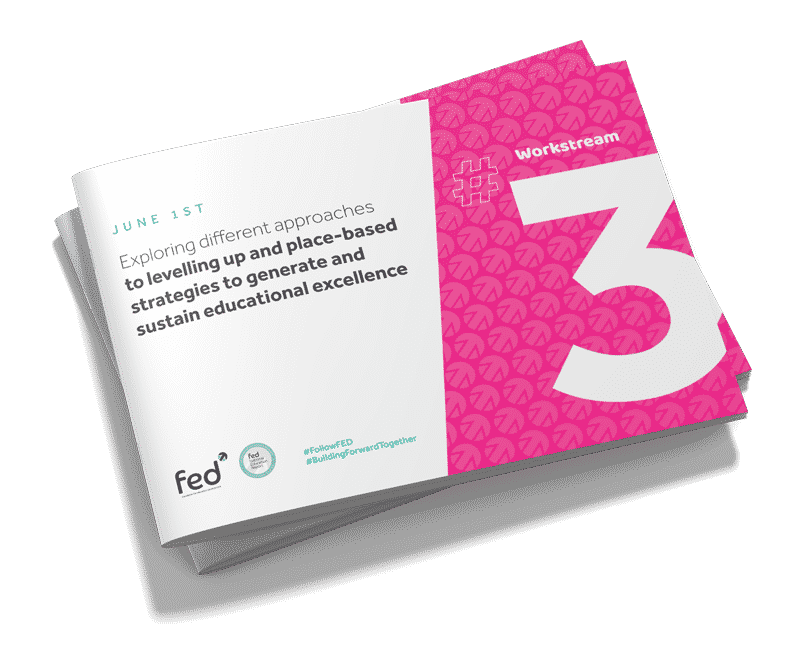Following the launch of the FED National Education Consultation Report, we are hosting a series of 4 roundtable discussions seeking the views of all stakeholders to focus on what is needed to deliver a long-term vision and plan for education on our 4 workstreams.
In our third roundtable we are discussing Workstream 3 – Exploring different approaches to levelling up and place-based strategies to generate and sustain educational excellence. For this important discussion, we asked Dr Ann Limb to provide a think piece during the roundtable to help stimulate our thinking.
In this blog, Dr Ann Limb CBE, a FED Ambassador, Independent Chair of the UK Innovation Corridor amongst many other roles, challenges us with the thought that ‘notions of place are bounded only by the limitations of our imagination’.
Leading locally: partnering regionally: impacting nationally, excelling globally: five premises and five characteristics
In taking forward the next stage of the FED’s work to build a long-term vision and plan for education and skills, workstream 3 focusses on different approaches to levelling up and place-based strategies to generate and sustain educational excellence.
This brief think piece examines some of the issues that arise from the current policy environment in relation to place-making. It acknowledges the range of different, and evolving, governance and delivery systems that exist across the UK. It recognises the consequent significant variation in local and regional social and economic geographies that result from this. It hints at the challenges and opportunities offered by this situation, at this juncture, for
- campaigning voices like the FED,
- for leaders and practitioners of education and skills delivery, assessment, accreditation and quality assurance, and
- for communities, local authorities and local bodies and regional structures
It does not cover any of these in detail; rather it offers a perspective to stimulate discussion, ideas, insights and imagination that might guide the development of the workstream going forward. This thinking needs to be debated, challenged, and tested and strengthened.
Five premises that might inform an effective place-based approach
- place need not be defined by institution – a school, MAT. FE College, training provider, adult education and community centre, university, or local authority
- place should not be determined on basis of the different institutional governance arrangements in those institutions, communities and country components of the UK
- a sense of place is existential in terms of our own identity ‘who I am and where I fit in’ and essential to our personal well-being ‘where I belong and where I feel valued for my contribution’
- an understanding of the importance of place is core to productive, prosperous, and peaceful community building
- our notions of place are bounded only by the limitations we place on our own imagination
If some or all of the above factors are worthy of consideration, determinants of ‘a place-based approach to levelling up educational outcomes’ might be framed by examining ways in which we see the world, lead and work in the world, and develop appropriate skills to navigate the new world
Five characteristics that might found in a successful place-based approach
- demarcation of place is derived from, defined by, and lived out through its inhabitants who determine its values and exercise measures to ensure accountability; thus, place-making is constituted by ‘a community of values’
- strategic leadership of place requires leaders to be ‘in the place’ but not ‘of the place’; thus, place-making becomes an ‘ego-free and logo-free zone’
- building better places is a shared endeavour best achieved through working together and taking account of people’s and the planet’s interconnectedness; thus, place-making is based on collaborative working
- community building and sustainability requires innovation in thinking and working, benefitting both the individual and the whole; thus, place-making requires cognitive innovation
- successful place-based approaches require development of the ability to work with multiple and fuzzy boundaries, to adapt to a new world of ‘spatially distributed geographies’1 ; thus place-making fosters geographical ambidexterity
1 Andy Haldane, Chief Economist at the Bank of England, member of the Bank’s Monetary Policy Committee and Chair of the Government’s Industrial Strategy Council
Workstream 1 – Develop a vision, purpose and objectives for a 10-year plan. Read Professor Fiona Forbes’ blog here.
Workstream 2 – Develop a framework to develop and govern a 10-year plan. Read Patrick Wall’s blog here.



